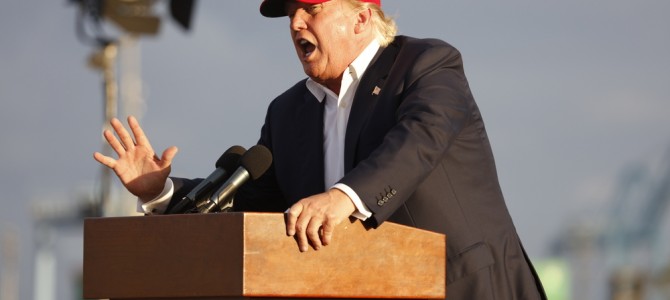
“[W]hatever anguish of spirit it may cost,” Patrick Henry said in 1775, “I am willing to know the whole truth; to know the worst, and to provide for it.” Republicans, and conservatives more generally, would do well to adopt this maxim regarding Donald Trump.
It is less than a year until the 2016 elections, and Trump shows no real signs of going away. The man that should have been a laughable six-week distraction has turned into an incomprehensible near-six-month frontrunner. There is no longer any merit nor utility to pretending he is not a serious threat to the Right’s prospects in 2016.
At ThinkProgress last month, Judd Legum cobbled together nearly half a year’s worth of the-end-is-near predictions for Trump’s campaign, beginning in July. It’s been five months of assuming that Trump’s bid for the candidacy has been teetering on the brink, while he has steadily creeped upward in the polls. Trump has been towering above the rest of the field since August.
Donald Trump Isn’t a Fluke
Ben Carson overtook Trump for about five baffling minutes in early November, after which Carson’s numbers dropped sharply. It is perfectly reasonable to assume Carson’s numbers will continue to plummet and he will eventually leave the race. It is not quite so reasonable to assume the same about Trump.
The latest numbers show that Trump’s closest competitor is Rubio—averaging 15 points below the Donald. It shouldn’t be this way. Rubio is at least the most eloquent Republican politician in the race, if not the last 15 years, while Trump at times appears literally illiterate—but the gap persists nonetheless. There is now great hay being made over Trump dipping in the polls by 12 percentage points, but these figures are from a Reuters online poll, and it will take more than a Reuters online poll to shake the foundation of Trump 2016.
Most intelligent people are at a loss as to what is to be done about Trump’s seemingly-unshakable success, as well they should be. Trump is a bizarre, capering spectacle of successful incoherence, a phenomenon that by any reasonable understanding should simply not exist, like firenados or volcanic lightning.
But whatever the inexplicable rationale for his continued relevance—whether it’s populist anger with “the establishment,” or the draw of Trump’s peculiar aversion to reality, or the appeal of his red-faced billionaire bluster—we must admit this first and foremost: Trump is fully capable of destroying the Right’s chances for the presidency in 2016.
Let’s Admit We Have a Donald Trump Problem
He will do this in one of two ways: by winning the nomination and losing spectacularly to a delighted Hillary Clinton, or by losing in the primaries and subsequently running a temper-tantrum Independent campaign that captures enough votes to put another Clinton in the White House.
The Clinton Machine is gleefully betting on either one of these. The Clintons, like the Left in general, have always subscribed to Chernyshevsky’s reputed maxim of “the worse, the better,” and this means the GOP has two additional adversaries this election cycle after the Democratic frontrunner: Trump the Republican and Trump the Independent.
The former could and quite possibly may be neutralized by either Rubio or Cruz, but the latter poses an absolutely credible threat. Trump has both the mentality and the emotional depth of an eight-year-old brat, and he will not take kindly to being shoved aside in favor of someone who’s actually capable of doing the job.
GOP may have to deal with this when it comes along. But we will be helpless to do anything about Trump unless, like the old Alcoholics Anonymous maxim, we first admit we have a problem.
Let us stop making gleeful and self-assured predictions of Trump’s imminent demise. He may indeed be on the way out, but we can no longer afford to simply assume it. We should instead look at Trump in the same way that we look at Hillary Clinton: as an inevitably, a contingency that is all but certain in some form or another, something that must be honestly studied and planned for.
Thanksgiving has passed. 2015 is almost over. We no longer have the luxury of blithely supposing that Trump is anything other than a serious and long-term presence in the 2016 field.









